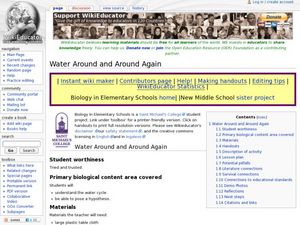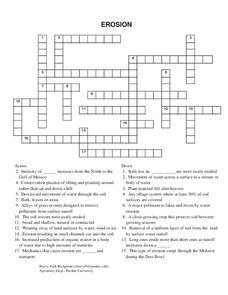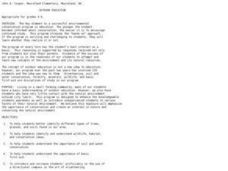Curated OER
Save Our Soil
Students explore the need for good farm land and reasons for the disappearance of agricultural areas. They brainstorm environmental friendly decisions and soil conservation. In their community, students explore new land developments...
Curated OER
Soil Erosion Demonstrations
Learners conduct experiments demonstrating soil erosion and the benefits of conservation practices. Working in groups, they use topsoil and sand in shallow boxes as models to examine the effects of water on soil and sand with and without...
Curated OER
Eye On Conservation Drainage Basin
Middle schoolers are able to describe the importance of wetland vegetation. They describe the impacts human activities have on water systems. Students compare and contrast the effect of different soil types on water filtration.
Curated OER
Water Pollution
Fifth graders observe and record what happens when household products are added to a tank of water to depict water pollution. They brainstorm ideas of how to clean the contaminate out of the water before watching demonstrations of...
Curated OER
Testing the Water
Students develop and test a hypotheses through collecting and recording water quality data. They perform their tests outdoors in a location with a safe stream and easy access for students. Their various experiments involve the entire...
Curated OER
Looking At Water: a Walking Field Trip
Fourth graders observe the effects of water on the soil and record those effect by drawing sketches of water erosion and conservation practices.
Curated OER
Stream Ecology In Wisconsin and Puerto Rico
Students identify the different types of water and explain in what proportions they exist on Earth. They identify and correctly label the parts of the water cycle and how these parts interact with each other. Students identify the...
Curated OER
Erosion Exploration
Ninth graders investigate the factors that increase soil erosion. They identify how the environment is affected by erosion. In small groups, 9th graders research erosion problems in various locations. Groups brainstorm ideas to help...
Curated OER
"Wet" Your Appetite: Conserving Water
Students investigate how water is utilized in producing food. In this agriculture lesson, students examine how much water goes into the creation of their daily menu. Students create a new menu that can conserve water and cut their water...
Curated OER
Class Conservation Corps (CCC)
Students investigate how the loss of soil, a valuable natural resource, affects their lives through loss of productive land to grow food, loss of coastal land mass, and poor water quality from runoff. They design a project to keep soil...
Curated OER
Water Around and Around Again
Young scholars form a hypothesis for a water cycle experiment. In this water cycle lesson plan, students create their own environment with water and earth to study the water cycle. Young scholars complete a handout to make a hypothesis...
Curated OER
Water Pollution
Fifth graders examine what contaminated water looks like, and how it becomes polluted. They examine a teacher demonstration of water is not polluted but does contain rocks and other things that do need to be cleaned out before drinking...
Curated OER
Erosion
In this erosion worksheet, students complete a crossword puzzle given 17 clues about the types of erosion, the causes of erosion and the results of erosion.
Curated OER
Land Use Issues
Students examine soil types and determine the ability of each to absorb water. Working in groups, they time how long it takes for water to seep out the bottom of the cups. They examine soil components, conservation, erosion, and tree...
Curated OER
Natural Resources: Can We Use Them Forever? Grade 2
Bright colors and animation are great ways to attract a young students attention. Students are introduced to the concepts of renewable and non-renewable resources as they pose the question, will our resources be around forever? This...
Curated OER
Careers With an Aquatic Emphasis
Students are introduced to careers with an aquatic emphasis. They take a self-evaluation test on what they enjoy in school to determine which career is right for them. They listen to people in the field discuss what their job is like.
Curated OER
Outdoor Education
Students increase their awareness of their natural environment. They engage in activities which emphasize the importance of conservation and create an interest in nature and conserving the natural environment.
Curated OER
Renewable vs. Non-Renewable Resources
Fifth graders, after brainstorming why conservation of resources is important, distinguish between renewable and non-renewable resources. They make a list of different types of natural resources on the board and then sort them into two...
Curated OER
Don't Use it All Up
Students observe the way that a sponge absorbs liquids and discuss how we our use of natural resources affects the environment around us. They discuss the need to conserve resources so we don't run out of what we need.
Curated OER
Sense Of Place
Students study ecology, listen to speakers and research conservation topics. In this investigative lesson students discuss wilderness resources, learn about Native Americans and participate in activities that help them to better...
Curated OER
KFC Lesson Plan 1 - Dirt
Students study soil. In this soil lesson, students work at four different centers. They investigate what soil is made of,examine soil components, look at soil erosion, examine the soil in different biomes. They wrap up the lesson by...
Curated OER
There's a Watershed in my Backyard!
Students explain what the term watershed is by creating a model. In this science, geography lesson, students demonstrate how the water moves in a watershed. Additionally, students learn about point source and nonpoint source pollution....
Curated OER
Be a Watershed - Create a Living River
Students investigate water ways by conducting an experiment with classmates. In this natural resources lesson, students define a watershed and identify where large ones are located within the United States. Students utilize cups,...
Curated OER
Florida's Springs
Students calculate the water usage for irrigation of school grounds. They use maps in determining which areas are irrigated.

























